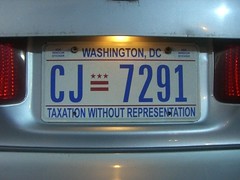
Tip o’ the hat to me dear mum, who just sent me this article on how officials from the local government of Washington, D.C. who are traveling the country to drum up support for D.C. statehood are receiving the indifferent response that they probably should have expected.
The reason for the D.C. statehood movement, which is extremely popular among District residents and virtually unheard of elsewhere, is that since those who live in the district don’t have any real representation in Congress, it’s unfair that they’re held to federal laws and regulation. Their battle cry, based on similar sentiment from the American Revolution, is that they live in an democratic system of “taxation without representation”. And that photo is real — they have it on the license plate and everything.
And if you subscribe to small-r republican principles, you might see their point. Sure, Washington, D.C. has a lot of Congressmen, lobbyists, and other power brokers, but that doesn’t mean that all 600,000 people who live in the city are wheeler dealers who are shaping the destiny of the federal government. While the city has its wealthy areas, much of it is working class, and their claims to disenfranchisement shouldn’t be lightly dismissed, especially since there are several states that have a lower population than D.C., yet have their full Congressional complement.
The problem is that outside D.C. itself, no one cares about this issue. And even if they did, it’s arguable that it would take an amendment to the U.S. constitution to change things, which is the way D.C. residents got electoral votes in the presidential election. That’s hard to do even when people around the country actually want something. There are other options than statehood however. Personally, I’d just give the whole place back to the Piscataway Indian tribe, although I doubt that would set well with the city’s current inhabitants. Another option is to return the city to being part of Maryland, from which it was carved in the late 18th century, and just keep a “federal enclave” separate from that state, one without residents. There’s precedent for this, in that the portion of Virginia that was ceded to be part of D.C. was given back in the 1840’s, since it didn’t seem at the time like the federal government would ever be large enough to need it, among other reasons.
One option that I never hear people suggest, and it sort of surprises me, is to solve the taxation without representation problem not by adding representation, but by removing taxation. Especially considering much of the city isn’t affluent, it would be a prosperity enhancing move to say, “You don’t get a vote? Fine, no federal taxes for your residents.” Do that, and watch the place become the biggest boom town ever seen in North America. Maybe it would even have the healthy effect of causing people in other parts of the U.S. to realize that taxation, and maybe even Congressional representation, are overrated.

